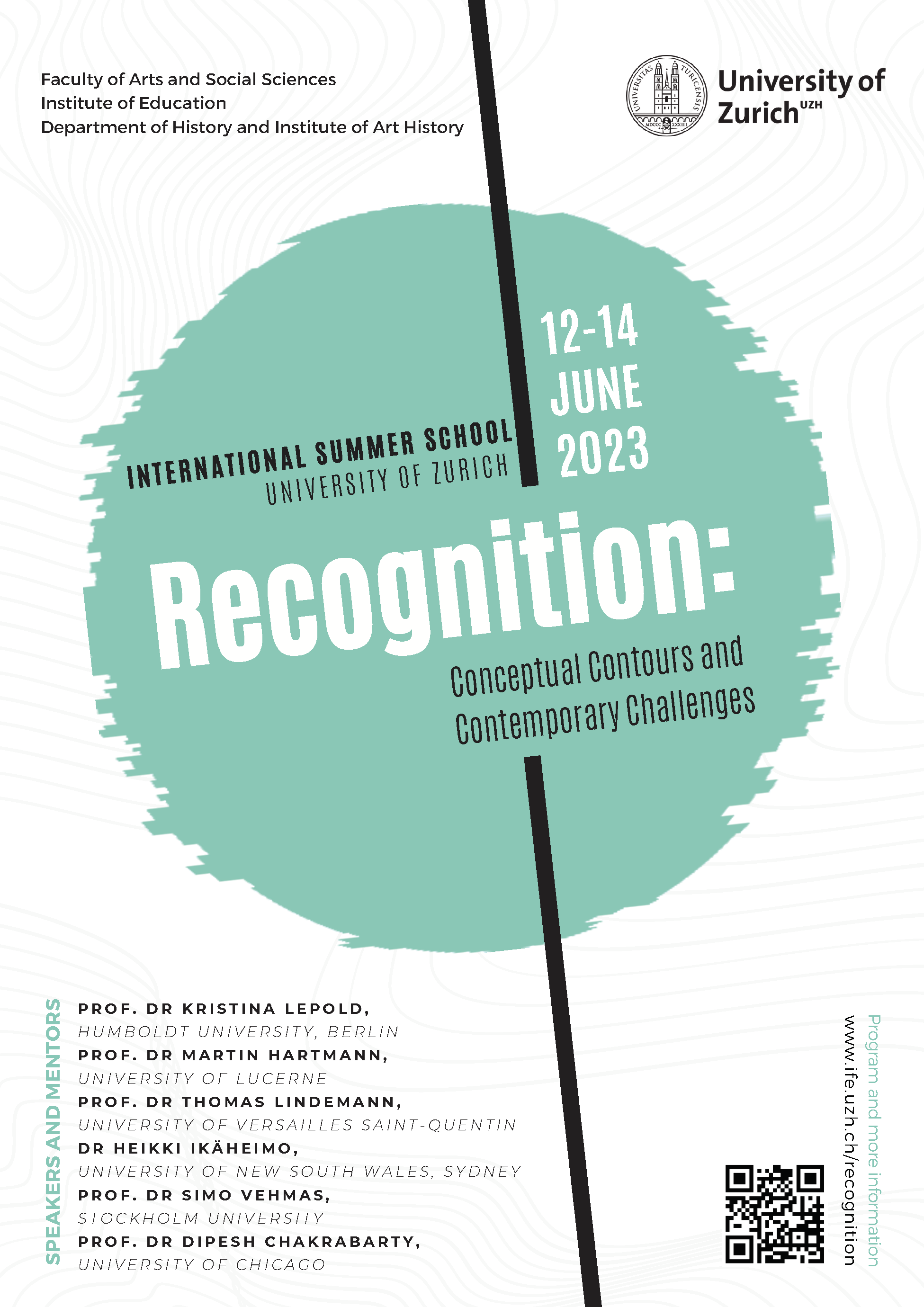International-Summer-School-“Recognition--Conceptual-Contours-and-Contemporary-Challenges”-(12-14.06.23)

Theme and concept
Few concepts in social, political, and philosophical thought have received such broad public interest as the concept of recognition. During the last two decades, the concept of recognition quickly gained importance in social and political philosophy. Since then, countless works – far beyond the field of political philosophy and social philosophy – have been produced in which, above all, the individual and interpersonal meaning of recognition has been explored theoretically and empirically.
Despite these achievements and the attempts to better understand recognition theoretically and conceptually and to research it empirically, many challenges remain.
The Summer School focuses on the following challenges:
- The inherent ambivalence of the demand for recognition: The concept of recognition is ambivalent and can be entangled in the maintenance of problematic social arrangements (e.g. problematic gender relations or social hierarchies shaped by colonialism). Additionally, the resurgent forms of populism and the moral-political exaggeration of social questions, demands, and conditions point to the inherent ambivalence of the demand for recognition and thus to the question of when and for what reasons we owe others recognition and when we do not.
- The lack of a socio-theoretical underpinning of the demand for recognition: The recognition debate lacks a deeper socio-theoretical anchoring of the demand for recognition. This gap is also evident in societal, social, and political fields. This is all the more regrettable as the importance of the recognition issue is also very evident in recent conflicts, for example in current (civil) wars (Ukraine, Syria, Tigray, etc.) or conflicts over the meaning of religious and cultural symbols and forms of expression in liberal societies (e.g. the debate over the banning of religious symbols in France).
- Its anchoring in Western liberal thinking: The debate on recognition, which is predominantly anchored in Western liberal thinking raises a series of important questions – for example, how to deal with the history of colonialism and how to overcome it? Of what importance is recognition in the relationship between Western nations and societies from the so-called Global South? These questions show that it is unclear how the concept of recognition can be applied sensitively and historically reflexively in transcultural, multi-ethnic societies characterized by diversity and heterogeneity.
- The rationalistic character of the demand for recognition: The concept of recognition has – like many concepts that emerged in the Enlightenment – a strongly rationalistic basis. Recognition can and should be given to those who can recognize others and themselves, or who can express recognition internally and externally according to the standards of rational reason. However, some particularly marginalized groups in society are unable to do precisely that, or only in a limited form. For example, people with severe cognitive disabilities have difficulty articulating their needs and therefore struggle to be recognized as equal partners in a dialogue.
The summer school focuses on four interdisciplinary, thematic clusters. Each PhD student can apply to one cluster.
- International conflicts and social conflicts in liberal societies
- Populism, moralisation, hypermorality and recognition
- Decolonisation and recognition of historical injustice
- Recognition of people with severe disabilities
Speakers and mentors
Prof. Dr Kristina Lepold, Junior Professor of Social Philosophy/Critical Theory at Humboldt-Universität zu Berlin.
Prof. Dr Martin Hartmann, Professor of Philosophy with a focus on practical philosophy at the University of Lucerne.
Prof. Dr Thomas Lindemann, Professor of Political Science at the University of Versailles Saint-Quentin and of International Relations at the Ecole Polytechnique.
Dr Heikki Ikäheimo, Senior Lecturer at the University of New South Wales in Sydney, Australia.
Prof. Dr Simo Vehmas, Professor of Special Education at Stockholm University in Sweden.
Prof. Dr Dipesh Chakrabarty, Lawrence A. Kimpton Distinguished Service Professor of History at the University of Chicago.
For the University of Zurich: Prof. Dr Franziska Felder (Institute of Education), Prof. Dr Roland Reichenbach (Institute of Education), Prof. Dr Bärbel Küster (Institute of Art History), Prof. Dr Gesine Krüger (Department of History)
Application
Who can apply?
Doctoral Students from the following fields are encouraged to apply: Education, Communication Science, Media Research, Sociology, Ethnology, History, Social Anthropology, Cultural Studies, Political and Social Philosophy, Political Economy, and Political Science. PhD students from the University of Zurich and outside are encouraged to apply.
No fees charged. All UZH PhD students receive 3 ECTS points for participating in the Summer School.
Application form (separate document)
Please fill in the application form and send it to franziska.felder@uzh.ch by May 1st 2023.